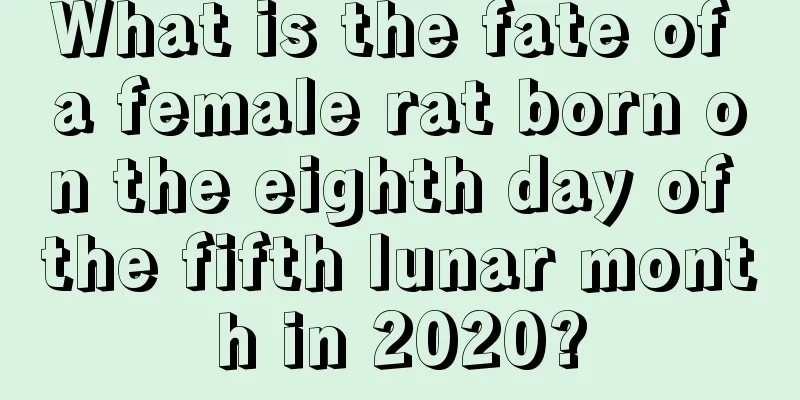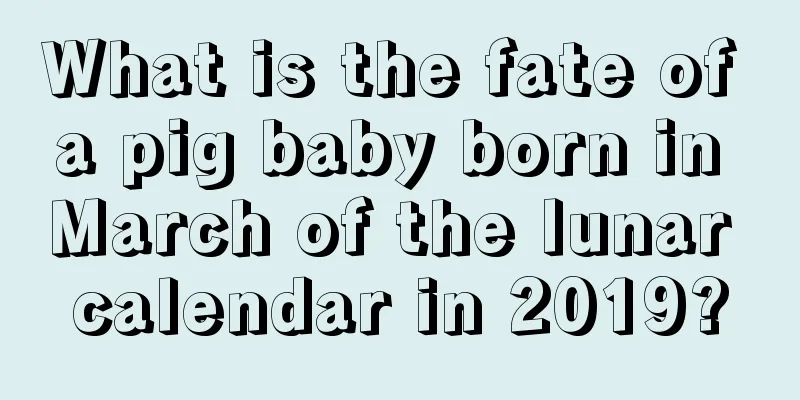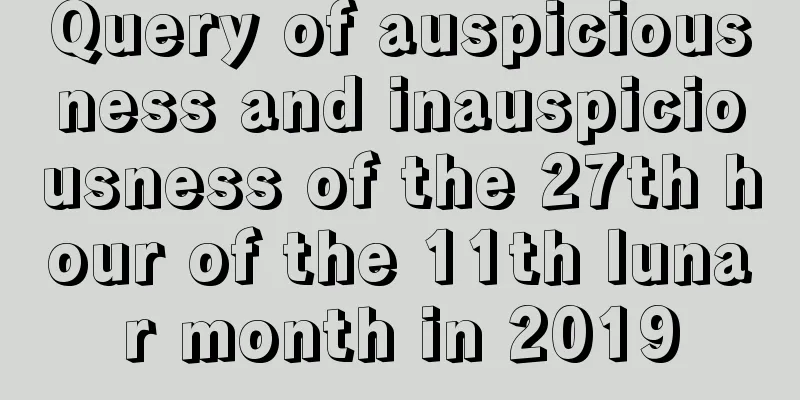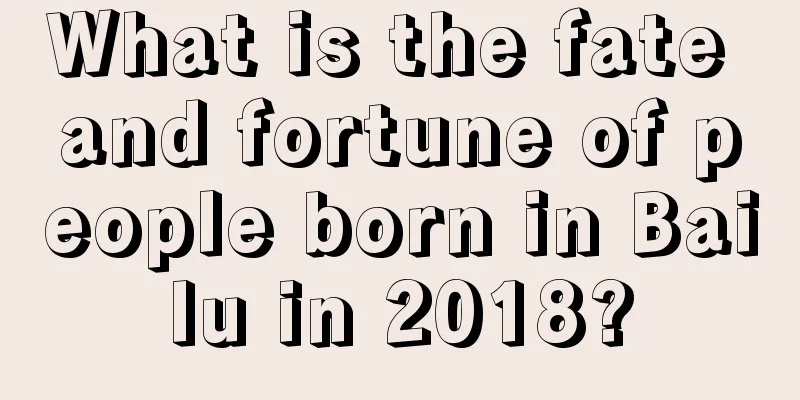What other customs are there during the Qingming Festival besides tomb sweeping? Why do we eat Qingtuan during the Qingming Festival?
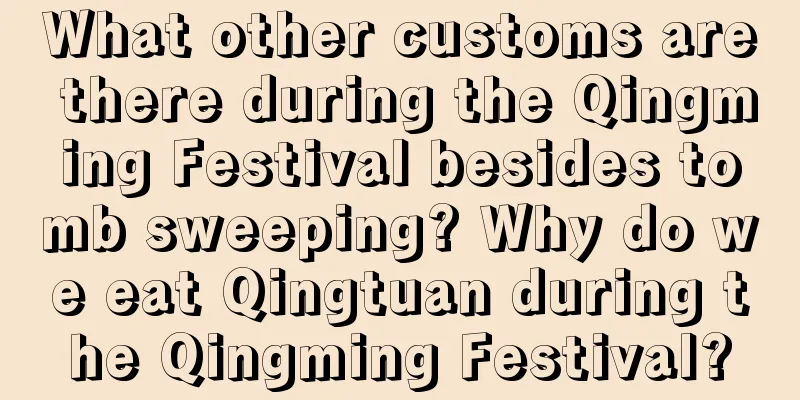
Qingming Festival is not only a festival for tomb sweeping, but also a happy festival for getting close to nature, going outings, and enjoying the fun of spring. What are the customs and activities of Qingming Festival? Chinese people have attached great importance to auspicious days since ancient times. Do you want to know more about auspicious days in March of the lunar calendar in 2022? Then click on Mr. Shui Mo's website to find out more.What other customs are there during the Qingming Festival besides tomb sweeping?1. OutingThere is a custom of outing during the Qingming Festival, which was called "Tanchun", "Xunchun" and "Tachun" in ancient times, which means a spring outing, generally referring to a walk in the suburbs in early spring. The Chinese people have long maintained the custom of outing during the Qingming Festival, and the outing custom has a long history. The Qingming Festival is a time of spring, when everything is budding. It has long been a custom to go on a picnic outdoors to welcome the spring. According to the "Book of Jin", every spring, people would go to the suburbs together to enjoy the spring scenery. The custom of outing was particularly popular during the Tang and Song dynasties. According to the "Old Book of Tang", "In the second year of Dali, on the day of Renwu in February, I went to Kunming Lake for an outing." It can be seen that the custom of outing in spring has long been popular. 2. Tree Planting The custom of planting trees during the Qingming Festival has existed since ancient times, because around the Qingming Festival, when the spring sun shines and the spring rain falls, the survival rate of planted seedlings is high and they grow fast, making it a very suitable period for planting. The custom of planting trees on Qingming Festival is said to have originated from the custom of wearing willows and planting willows on Qingming Festival. There are three common theories about the origin of the custom of planting willows on Qingming Festival: one is that it is said to be to commemorate Shennong, the ancestor who taught people how to farm, and later developed the meaning of praying for longevity; the second is related to Jie Zitui. It is said that when Duke Wen of Jin led his ministers to the mountain to pay tribute to Jie Zitui, they found that the old willow tree that Jie Zitui had leaned on before his death had resurrected, so they named the old willow tree "Qingming Willow"; the third is that Emperor Taizong of Tang gave willow wreaths to his ministers to show blessings and drive away epidemics, and the people used them to drive away ghosts and evil spirits. 3. Flying a kite There is a custom of flying kites during the Qingming Festival. It is usually carried out during the Qingming festival and is not only very popular among children, but young men and women also like this activity very much. Kites, also known as "paper kites" or "kites", are made of paper or silk pasted onto a bamboo frame. They can be released into the sky by pulling a long line tied to them. During the Qingming Festival, people set off fireworks not only during the day but also at night. At night, strings of colorful lanterns are hung under the kite or on the wind-stable pull line. They look like twinkling stars and are called "magic lanterns." In the past, some people would cut the strings after releasing the kites into the blue sky and let the breeze carry them to the ends of the earth. It was said that this would ward off disease and disaster and bring good luck. 4. Swing In ancient times, there was a custom of swinging on swings and flying kites on Qingming Festival. It was one of the main recreational activities on this day in ancient times and was loved by children and young men and women. In ancient times, swings were mostly made of tree branches as frames, tied with ribbons. Later, they gradually developed into swings with two ropes and pedals. Swinging can not only improve health, but also cultivate courage. It is still loved by people, especially children. Wang Renyu of the Five Dynasties wrote in "The Remaining Stories of Kaiyuan and Tianbao" that "During the Cold Food Festival, a swing was erected in the Tianbao Palace for the concubines to play and have fun. The emperor called it the play of the half-immortals, and the people in the capital called it that as well." Wen Yanbo, the prime minister of the Song Dynasty, wrote in his poem "Passing by Dragon Gate on the Cold Food Day" that "beside the bridge, willow trees hang down green threads, and there are many swings with colorful ropes." A swing means moving by pulling on a leather rope. Why do we eat Qingtuan during the Qingming Festival?The custom of eating Qingtuan during Qingming Festival can be traced back to the Zhou Dynasty more than 2,000 years ago. According to the "Book of Zhou", there was a law at that time that "in the second half of spring, a wooden bell should be used to announce the fire ban in the country", so the people extinguished their fires and observed the cold food for three days. During the Cold Food Festival, that is, one or two days before Qingming Festival, it is designated as the "Cold Food Festival".The origin of eating Qingtuan during the Qingming Festival is said to be related to the Taiping Rebellion: One year during the Qingming Festival, Chen Taiping, a capable general of the Taiping Heavenly Kingdom's Li Xiucheng, was being hunted by Qing soldiers. A farmer who was farming nearby came forward to help, disguised Chen Taiping as a farmer, and had him farm with him. The Qing soldiers did not give up even though they failed to capture Chen Taiping. They added more soldiers and set up guard posts in the village. Everyone leaving the village had to be checked to prevent them from bringing food to Chen Taiping. When the farmer returned home and was thinking about what to bring for Chen Taiping to eat, he accidentally slipped on a clump of mugwort. When he got up, his hands and knees were stained with green. The farmer immediately came up with an idea. He quickly picked some mugwort, went home to wash it, boiled it, squeezed out the juice, and kneaded it into glutinous rice flour to make rice balls. Then he put the green dumplings in the grass, sneaked past the sentry at the village entrance, and fed them to Chen Taiping. Chen Taiping ate the green rice dumpling and found it fragrant, glutinous and not sticky to teeth. After he recovered his strength after dark, he bypassed the Qing army checkpoints and returned safely to the base camp, where he reported the matter to Li Xiucheng. Therefore, Li Xiucheng ordered all the Taiping Army to learn how to make this kind of green ball in order to defend themselves against the enemy. Over time, this custom spread among ordinary people and has continued to this day. Do you want to know your own Bazi? Want to figure out where your golden marriage is? Click on the [Premium Calculation] below to calculate your horoscope and fortune! |
<<: Is April 18th of the lunar calendar 2022 a good day? Can I have a haircut?
>>: Is April 28th of the lunar calendar in 2022 an auspicious day? How to judge the daily fortune?
Recommend
Can I register for a marriage certificate on the Minor Cold Day in 2022? Is the Civil Affairs Bureau open?
Marriage is one of the major events in life, and i...
Where is the most fun place to take your kids on Children’s Day, June 1, 2018?
Introduction: Playing is a child's nature, and...
Is it a good time to open a new store or company on the seventh day of the seventh lunar month in 2020?
Is it a good time to open a new store or company ...
What is the attribute of February 25th in the lunar calendar in 2020? Is it an auspicious day?
Every day is different and has different attribute...
What is the fate of a boy born on the fifth day of the tenth month of the lunar calendar? Do you often have noble people to help you?
Introduction: Although every child cannot choose t...
Is November 21st of the lunar calendar in 2018 a good day for funerals?
"The Book of Rites: Monthly Ordinances" ...
What is the zodiac sign of people born on the first day of April in the lunar calendar in 2020? How is your personal fortune?
Date table of the twelve zodiac signs. In Western ...
What are the do's and don'ts on October 22, 2020?
Every day has good and bad, auspicious and inausp...
Can I get a haircut on the eighth day of the third lunar month in 2022? Is this a good day?
The third month of the lunar calendar is the month...
Check the lunar calendar for the second day of the fifth month in 2019. Is it a good day?
The earthly branch of the fifth month in the luna...
Can’t the funeral be held on the eighth day of the first lunar month in 2018?
Introduction: Human life can be long or short, and...
Is it okay to hold the signing ceremony on April 29th of the lunar calendar in 2022? How to choose a place?
The fourth month of the lunar calendar is a beauti...
What day is Army Day in 2021? Brief introduction to the significance of Army Day
The Army Day was established by the Chinese People...
Is it good to travel a long distance one day after the heavy snow in 2020? Will it be cold during the heavy snow season?
Introduction: It is generally necessary to choose ...
Is it a good day to open a new store on the third day of June 2019?
The sixth month of the lunar calendar is the seas...
